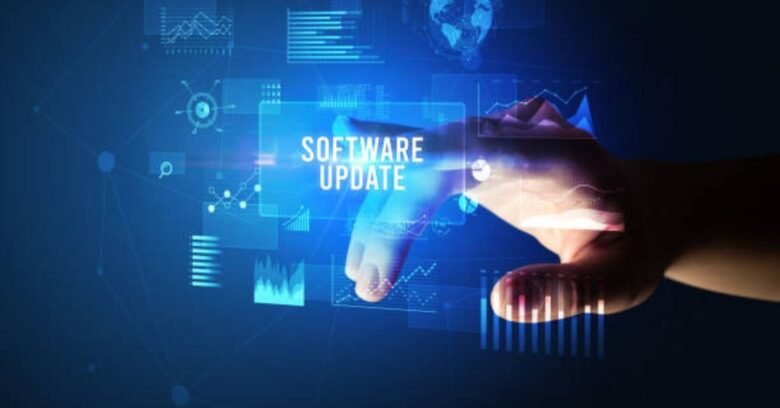In today’s fast-paced digital world, software updates have become essential for ensuring the health and security of any computer, smartphone, or online system. Many users avoid these update notifications because they believe they are unnecessary or take too long. However, not installing updates can expose your device to hacker attacks, data breaches, and operational problems. Software updates are crucial for protecting personal data, improving program efficiency, and enhancing the user experience. They do much more than just add new features. By understanding the importance of updates, users can better protect their devices and their online security. With rapidly evolving cyber threats, staying up-to-date is not just a good thing; it’s a necessity.
Software Updates Improve Security:
Security is the main reason why you should update your software regularly. Criminals are constantly looking for vulnerabilities in older software to exploit and steal private data. Developers release updates to fix these vulnerabilities and protect users from threats. If you wait too long to update, malware, ransomware, and other malicious programs targeting older versions can infiltrate your system. Updates often fix known security vulnerabilities and improve encryption and login systems, keeping your data secure. By applying these patches regularly, you protect your device from hackers and reduce its vulnerability to attacks.
Improving Performance and Maintaining Stability:
Besides ensuring computer security, keeping software up to date is also crucial to improving speed and stability. Outdated software versions can cause slowdowns, crashes, and even incompatibility with newer technologies. Updates are designed to fix bugs, make codes more readable, and improve compatibility with a wider range of devices and systems. For example, a current operating system can be more compatible with newer programs, resulting in faster performance and fewer interruptions. This ensures a better user experience and fewer interruptions. Updating software can also prevent bugs that can cause system crashes or data loss, making your device more reliable and faster.
Securing Financial and Personal Data:
Protecting personal and financial information has become crucial as more and more activities take place online. Regularly updating software can better protect sensitive data stored or transmitted via devices and apps. Hackers looking to steal passwords, credit card numbers, or personal information often target older systems. Updated apps, websites, and operating systems are more secure because they use stronger firewalls and more advanced encryption. This reduces the risk of data breaches, identity theft, and unauthorized intrusions. Users can protect their privacy and financial well-being by keeping their software up to date.
Adaptable to New Technologies:
The world of technology is constantly changing, with new devices, software, and applications constantly emerging. Regularly updating your software ensures your computer has the latest features. Developers frequently update their products to ensure compatibility with new tools, devices, or operating systems. Without these updates, some applications may not work properly or at all on your computer. For example, a new printer, cloud service, or smart device might require the latest drivers or APIs to communicate properly with your system. Users who stay up-to-date can use the latest features without encountering technical issues or downtime.
Preventing Cyberthreats and System Vulnerabilities:
Cyberthreats are constantly evolving and becoming increasingly intelligent and sophisticated. Attacks such as hacking, spyware, and ransomware are often carried out by hackers exploiting known vulnerabilities in older software. These vulnerabilities are patched with regular updates, making it more difficult for hackers to access your system. Software developers continuously monitor threats and release patches to prevent them. Failure to apply these patches can leave users vulnerable to attacks without their knowledge. Regularly updated systems are better prepared for new cyberthreats and provide users with the latest security procedures and detection technologies. This process protects systems and networks from hacker attacks.
Improved Functionality and User Experience:
Besides bug fixes, updates can also deliver improvements, making apps more user-friendly and adding new features. Developers use updates to enhance the user experience, add more useful features, and improve the overall system experience. For example, updates can make software more user-friendly and enjoyable by increasing speed, optimizing the layout, or improving accessibility. Regular updates also ensure that users get the best possible experience and meet current design standards and user expectations. By keeping software up-to-date, users gain access to new features and improved digital experiences.
Savings on Long-Term Maintenance Expenses:
If you neglect to update your software, a hack could result in costly repairs, data loss, and downtime. Older systems are more likely to have serious problems that require expert assistance. On the other hand, regularly updated systems are less prone to problems, meaning resolving these issues takes less time and money. By keeping all software up to date, companies can reduce the risk of cybersecurity breaches, which can lead to significant losses and reputational damage. Preventative maintenance, such as updates, is much less expensive than fixing them later. Regular updates are therefore a beneficial way to ensure smooth and reliable system operation in the long term.
Building Trust and Compliance with Regulations:
In industries that utilize private information, such as healthcare, banking, and e-commerce, compliance with security regulations is crucial. Companies can meet these legal and regulatory standards by ensuring their software is always up to date. Many compliance standards, such as the General Data Protection Regulation (GDPR), the Health Insurance Portability and Accountability Act (HIPAA), and the Payment Card Industry Data Security Standard (PCI DSS), require systems to be kept up to date to protect user data.
Failing to comply can lead to fines, data breaches, or a decline in customer trust. Companies that keep their systems up-to-date demonstrate their commitment to data security and privacy, which helps build trust with customers and business partners. Maintaining a secure digital environment through regular updates will increase user and stakeholder trust in the long run.
What Role Does Automation Play in Software Updates?
Many systems now offer automatic update functionality, which installs fixes without user intervention. This helps keep devices secure, even if users forget or delay updates. Automatic updates save time and reduce the chance of missing important fixes. However, users must ensure these updates come from trusted sources to avoid falling prey to fake update scams. Automation can also help large enterprises manage large numbers of devices, making it easier to keep their entire network up-to-date. Automation makes it easier for companies to maintain excellent digital security without having to constantly do it manually. This ensures consistently high security and speed.
The Consequences of Ignoring Updates:
If you don’t update your software, bad things can happen. When software becomes outdated, it becomes a vulnerable point in your digital environment. The result can lead to security breaches, data loss, or system damage. Cybercriminals target people who don’t update their software because it provides them with an easy way to gain access.
Neglecting updates creates security risks and leads to compatibility issues, reduced performance, and service disruptions. If companies don’t make the switch, they can face legal consequences, downtime, and dissatisfied customers. Delaying updates may seem like a minor issue at first, but it can quickly escalate into a major financial and security problem. Regular updates protect your systems from these unnecessary risks, just as medication protects your health.
Conclusion:
Regularly updating software is a crucial part of today’s cybersecurity and digital efficiency. It’s not just a technical matter; it’s a strategic step towards a secure, reliable, and sustainable system. By keeping software up to date, users and businesses can protect sensitive information, improve performance, and comply with security standards. Updates not only keep you safe but also enhance your experience and allow you to try new technologies. In an era of rapidly evolving cyberthreats, developing the habit of regular updates is crucial. Taking a moment to update today can prevent major problems in the future. In this interconnected world, keeping software up to date means staying safe, productive, and prepared for the future.
FAQs:
1. Why is software updating so crucial for security?
Updating software fixes vulnerabilities that hackers can exploit. Software updates strengthen system defenses, improve encryption, and protect personal information from hackers.
2. What happens if I don’t update my software?
If you don’t install updates, your system can be vulnerable to malware, data theft, and other program problems. This can also slow down your device or cause apps to malfunction.
3. How often should I update my software?
When a new software version is released, you should install it immediately. To ensure security, most systems allow you to set up automatic software updates.
4. Do you only add new features when you update software?
Not necessarily. Updates often add new features, but their primary purpose is to resolve bugs, close security holes, and make the system faster and more reliable.
5. Will updating software slow down my computer?
In most cases, updates make the system run better. However, major updates can require more resources, which can temporarily slow down the system until it is fully optimized.




